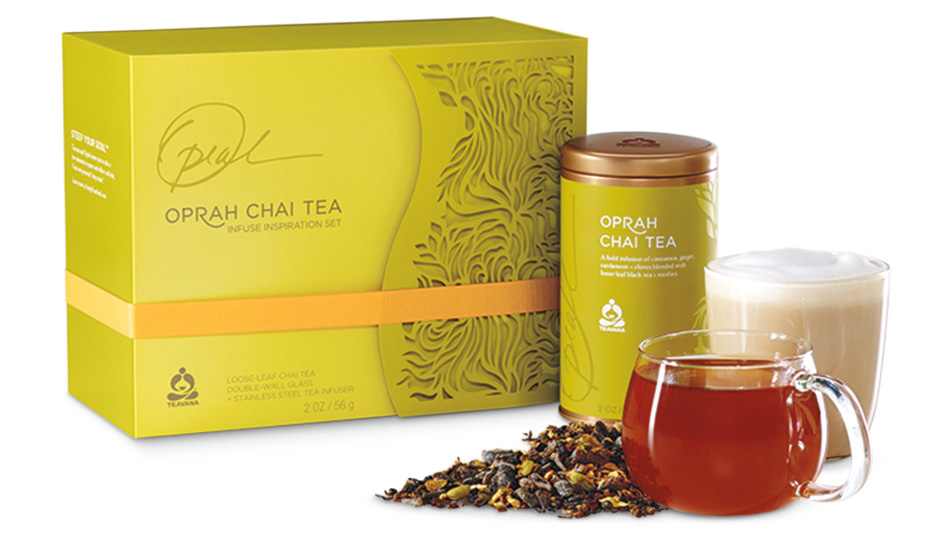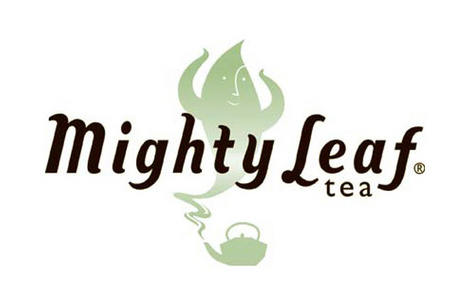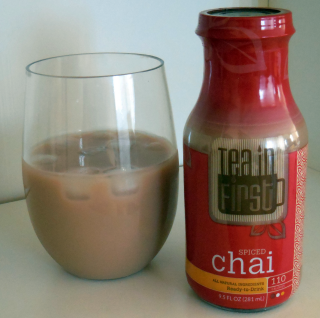What tea professionals need to start the week of Oct. 20, 2014 —
Oprah Winfrey sure can sell tea… Mighty good match… Starbucks will test a pre-order app and Apple Pay starts today… Sensient announces a promising tea flavoring technology… Which do you prefer: Milk or Tea In First?
Starbucks Donates $2 Million from Chai Sales
Starbucks announced the other day that it had donated $2 million to benefit educational opportunities for youth through the Oprah Winfrey Leadership Academy Foundation.

It’s been less than six months since Oprah supercharged the chai category and the beneficiaries extend well beyond Starbucks and Teavana. The company donates 25 cents for each Teavana Oprah Chai prepared beverage and $1 for every 2 oz. loose-leaf packet as well as $1 for the chai gift set or storage tin. The large gift set nets the foundation $4 for each one sold.
If half of the donation is from prepared beverages that would mean 4 million chais served and if half the donation is from packages and tins (accounting for another million sales) that suggests just under 1 million transactions a month for the past five months. That’s a huge increase from a single drink just introduced in March, especially since Starbucks sells several other chai drinks.
Starbucks sells an average 4 million cups of coffee a day.
Apple Pay Starts Today
The fingerprint purchase option on my new iPhone 6 is so convenient I’ve been buying iTunes and Apps on a whim – exactly as the genius Steve Jobs intended. Combine that convenience with the ability to pre-order Oprah’s Teavana Chai and the fast-pay option could boost traffic and speed service.
Starbucks customers with an iPhone will soon be able to shop 150 locations near Portland, Ore. Android apps are expected in 2015.
“This is the beginning of a national rollout. We feel we’re going to be constantly learning and improving how mobile ordering works,” Starbuck’s Adam Brotman, chief digital officer told Bloomberg.
Currently 15% of Starbucks sales are from mobile orders, representing 6 million weekly transactions from 12 million active mobile users in the US and Canada.
Source: Bloomberg
Mighty Good Match
Acquisitions of tea companies total more than $1 billion in the past three years with Teaopia, Teavana, T2, Tea Forte, Pickwick Tea and Mighty Leaf Tea among the top deals.
Two months after its sale to Peet’s Coffee & Tea the legions of Mighty Leafers loyal to the brand are witnessing a smooth transition.
“Now that we have completed the transaction, we really can’t imagine a brand that we could really feel as comfortable with,” co-founder Jill Portman told the San Francisco Business Times.
 Acquisitions are often acrimonious but these tea-friendly firms benefit from a nice fit. Co-founders Gary Shinner and Portman credit the benefit of a year-long courtship after Peet’s which approached the company following its own acquisition by German conglomerate Joh. A. Benckiser in July 2012.
Acquisitions are often acrimonious but these tea-friendly firms benefit from a nice fit. Co-founders Gary Shinner and Portman credit the benefit of a year-long courtship after Peet’s which approached the company following its own acquisition by German conglomerate Joh. A. Benckiser in July 2012.
“This is a win for both Mighty Leaf and Peet’s as we both share a dedication to premium quality and craft mastery that will become even stronger together,” Shinner said in announcing the sale.
Peet’s is legendary in specialty coffee. The founders were visionaries and the company, under the direction of CEO and President David Burwick, has continued to raise the bar on quality offerings first set by Alfred C Peet in 1966. Mighty Leaf has a similar pedigree.
“We’re both Bay Area companies with core values built on the highest standards of quality and deep commitment to craft – it’s a natural, complimentary fit,” said Burwick.
“This is an important step in Mighty Leaf Tea’s journey, and we’re excited to take our brand to the next level with Peet’s Coffee & Tea,” said Shinner.
Portman and Shinner were living in Chicago when they discovered great tea. Portman worked in architectural design and Shinner was an investment banker. The couple began dreaming of their own tea company in 1992 and relocated to San Francisco in 1996 to open Tea and Co., a shop that could be mistaken for the latest iteration in style and selection. Alas, it was ahead of its time and closed its doors in 2000 after the dot-com bust.
Shinner and Portman retained their wholesale clients and launched Mighty Leaf Tea just as loose-leaf became popular with hotels and resorts and a few restaurants concerned with sustainable practices.
The company used high-quality ingredients, chose more expensive biodegradable (backyard compostable) sewn pouches and ultra-premium positioning that landed Mighty Leaf contracts to supply cruise ships, department stores including Nordstrom and national airlines. In 2007 private equity firm VMG Partners, itself a new venture, bought a 20% stake and financed the move to supermarkets. Eventually Mighty Leaf would find itself on the shelves of 14,000 stores from Kroger and Safeway to Publix and Stop & Shop. Revenue is estimated at $31 million at the time of the sale.
Peet’s is headquartered in Emeryville at the other end of the San Rafael Bridge. During discussions the two like-minded ventures found common ground. Peet’s is undergoing rapid expansion, adding 60 stores by year end. It plans to sell Mighty Leaf blends alongside its existing line of single-origin teas in 300 retail locations.
Shinner and Portman will stay on until summer. Peet’s is recruiting a new chief executive to take their place.
Source: Peet’s Coffee & Tea, San Francisco Business Times
Fast Drying Flavor Coating
Blenders typically apply flavors to enhance the appeal of teas that contain dried fruit, floral and spice. Customers examining a colorful tea expect a whiff of pleasant aroma. In teabags the impact is less critical but the more expensive and showy the tea, the greater the expectation.
The most common technique is to spray liquid flavorings on the tea. The intense mist saturates the leaves but the good strong flavor remains for only a relatively short time after the leaves are exposed to air.
Special packaging such as vacuum or foil wrappers is necessary to retain freshness of these flavors.
 Spray drying resolves some issues, but a great deal of dust is generated during the flavoring process. And both spray dried and liquid flavorings are hygroscopic, and are thus not ideal for use in tea bags as they can cause unappealing stains.
Spray drying resolves some issues, but a great deal of dust is generated during the flavoring process. And both spray dried and liquid flavorings are hygroscopic, and are thus not ideal for use in tea bags as they can cause unappealing stains.
Dry flavoring is less aromatic in the tin but bursts to life when wet in the cup. These flavorings are more stable over time but somewhat unsightly as they dust the tea and inclusions, dulling its luster. Depending on the mesh, dry flavors can also settle, sifting through pyramid bags. Applying agglomerated flavors is a low-dust way of adding flavor to the leaves but best suited to tea that will be filled in tea bags.
Sensient Flavors, headquartered in Hoffman Estates, Ill., has developed a fourth option, a fast-drying, colorless coating ideal for blending premium tea.
These flavor coatings are not limited to tea leaves and can be applied to pieces of apple, for example, or lemon and orange peel. This allows manufacturers to add additional interesting components to blends that really grab the attention of consumers looking for that something extra special from their tea.
“The invisibility of the flavoring is a crucial aspect,” explains Hans-Juergen Sachs, General Manager Sensient Flavors, Beverage Europe. “Tea is a very natural and authentic product. Flavorings which are too heavy or characteristics which make the tea look artificial won’t meet the consumer’s desire for a sophisticated, premium product. With our new spray-coating technology, we have been able to improve the sensory profile of flavored tea without influencing the natural characteristics of the raw material.”
“This proprietary technology opens up a whole new world of possibilities for adding premium appeal to tea,” according to the company.
Coated leaves preserve a balanced sensory profile over a long period of time. The production process is virtually dust-free and the resultant tea has diminished hygroscopic properties.
The process results in a homogeneous blend with a constant flavor profile, according to the company. Leaves are completely dispersible and are thus easy for manufacturers to process. Flavoring is done at Sensient’s facility which means there are no extra costs for additional equipment. After treatment, the tea can be further processed by the manufacturer as usual.
A wide range of natural flavors are available for use with tea leaves. Samples are available based on black tea combined with a selection of popular flavors: bergamot, garden mint and jasmine. However, there are virtually no limits on possible compositions. For example, fruity notes can be combined with “creamy” flavors such as caramel or vanilla, suggests Sachs. And even cocktail notes can now find their way into the tea segment.
Sensient Flavors & Fragrance Group is a division of Sensient Technologies Corp., a $1.5 billion venture operating in 35 countries with a staff of 3,600. Learn more at www.sensientflavorsandfragrances.com
Tea in First
Tea In First launched a line of ready-to-drink low-calorie all natural chai this summer that is made with fresh milk.
Founder Nishita Mody said that he “wanted to create a modern take on the very traditional Masala Chi, while keeping in mind the health consciousness of our consumers.”

The Long Island-NY company starts with high quality tea. Tea goes in first, said Mody.
The Spiced Chai contains his unique blend of cardamom, cinnamon, cloves, ginger and black pepper. To replicate the rich flavor “you’d have to spend time obtaining all the spices and combining them with tea and milk in a saucepan,” says Mody. “Now you can just go to your local store and enjoy it chilled or you can heat it up and have a hot cup of chai anywhere…in minutes!” he said. The 110-calorie, 9.5 oz. bottles are distributed at natural food stores, delis and convenience retailers in Boston and New York City. A suggested unit price was not disclosed. The bottles are available in four-packs. He plans to add a Matcha Latte to the line. Learn more at: www.teainfirst.com
? ? ?
Tea Biz serves a core audience of beverage professionals in the belief that insightful journalism informs business decision-making. Tea Biz reports what matters along the entire supply chain, emphasizing trustworthy sources and sound market research while discarding fluff and ignoring puffery.
Tea Biz posts are available to use in your company newsletter or website. Purchase reprint and distribution rights for single articles or commission original content. Click here for details.


